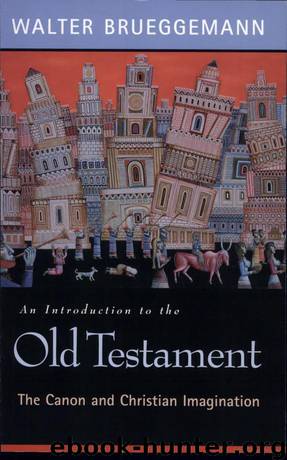An Introduction to the Old Testament: The Canon and Christian Imagination by Walter Brueggemann

Author:Walter Brueggemann
Language: eng
Format: mobi, epub
Tags: Religion, Bible Study, Old Testament, Christianity
ISBN: 9780664224127
Publisher: Westminster John Knox Press
Published: 2003-11-28T22:00:00+00:00
Such an approach is not very helpful because it is likely that only Psalm 137
can, with any reasonable certainty, be connected to a particular circumstance.
Attention should be given, with reference to issues of historical context, to the superscriptions that characteristically link psalms to historical events in the life of David (Childs 1971). (Psalm 51 is the best known of these, wherein it is linked to David’s crisis after the events relating him to Uriah and Bathsheba.) In general scholars judge that these superscriptions that situate the psalms in a particular way are not to be taken with historical seriousness, but rather constitute an interpretive guideline from a later community about how to understand
the particular psalms. In this connection, it is also useful to recognize that the formula “A Psalm of David” (as in Pss 3, 4, 5, etc.) is not a note on authorship, so that Davidic authorship of the Psalms is not held credible in critical study.
More likely, the formula should be translated “for David,” that is, “for the
king,” in a way that may suggest liturgical usage in the royal environs.
A second approach to the Psalter among Christians is an inclination to
read christologically, as though Jesus were either the speaker of the psalm, as The Book of Psalms
313
in Psalm 22, or the one who speaks as the righteous sufferer, or the subject
of the psalm, as in the royal psalms such as Psalm 2. Such an approach was
taken with great seriousness in the early centuries of the church and was
championed by Augustine; with the rise of critical study, however, it is clear that no direct link can be made to Jesus. That does not preclude a second
christological interpretive move once the Psalter has been taken seriously in
its own Old Testament context. This latter move is especially important in
the interpretive work of Dietrich Bonhoeffer (Bonhoeffer 1970; see Miller
2000, 345–54).
If we recognize that neither a historical nor a messianic approach is sus-
tainable in psalm interpretation, we may focus upon the singular contribu-
tion of Hermann Gunkel, a scholar of the early twentieth century who has
decisively influenced all subsequent psalm study. Gunkel came to see that the
psalms recur in a fairly limited number of rhetorical patterns (genres) and
that the several genres reflect social settings so that genre and setting are characteristically twinned. As a consequence, the psalms tend not to be free and
innovative speech, but are highly stylized and predictable in form, presumably in traditional societies that counted on the regularity of rhetorical patterns to shape and sustain life in certain ways: “Accordingly, genre research in the Psalms is nonnegotiable, not something one can execute or ignore according
to preference. Rather, it is the foundational work without which there can be no certainty in the remainder. It is the firm ground from which everything else
must ascend” (Gunkel and Begrich 1998, 5).
The work of psalm study, then, is to pay attention to the most distinctive
rhetorical patterns that characteristically carry certain content appropriate to specific contexts. Such patterns may be voiced with great imaginative variation, but the variations typically adhere to a constant pattern.
Download
An Introduction to the Old Testament: The Canon and Christian Imagination by Walter Brueggemann.epub
This site does not store any files on its server. We only index and link to content provided by other sites. Please contact the content providers to delete copyright contents if any and email us, we'll remove relevant links or contents immediately.
| Exegesis & Hermeneutics | New Testament |
| Old Testament |
The Five People You Meet in Heaven by Mitch Albom(3561)
The Secret Power of Speaking God's Word by Joyce Meyer(3182)
Real Sex by Lauren F. Winner(3014)
Name Book, The: Over 10,000 Names--Their Meanings, Origins, and Spiritual Significance by Astoria Dorothy(2979)
The Holy Spirit by Billy Graham(2944)
0041152001443424520 .pdf by Unknown(2843)
How The Mind Works by Steven Pinker(2813)
ESV Study Bible by Crossway(2774)
Ancient Worlds by Michael Scott(2682)
Churchill by Paul Johnson(2578)
The Meaning of the Library by unknow(2565)
The ESV Study Bible by Crossway Bibles(2550)
The Gnostic Gospels by Pagels Elaine(2527)
MOSES THE EGYPTIAN by Jan Assmann(2412)
Jesus by Paul Johnson(2352)
City of Stairs by Robert Jackson Bennett(2347)
The Complete Dead Sea Scrolls in English (7th Edition) (Penguin Classics) by Geza Vermes(2277)
The Nativity by Geza Vermes(2227)
Ancient Near Eastern Thought and the Old Testament by John H. Walton(2223)
